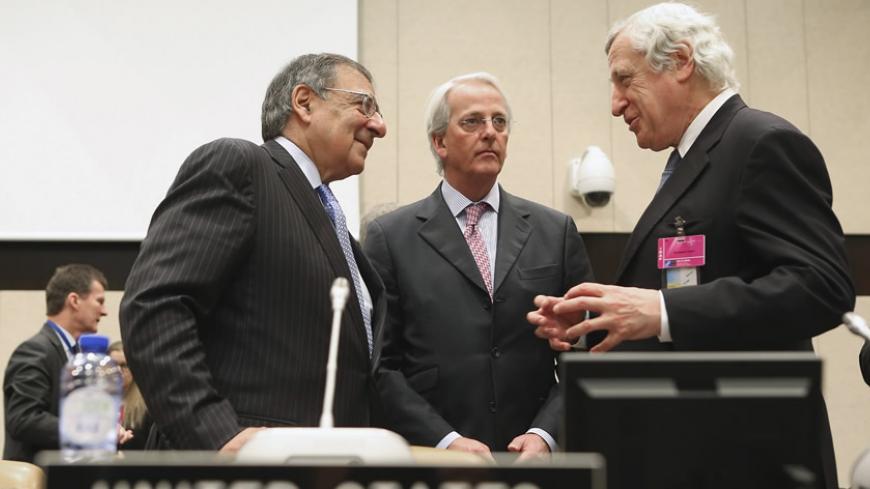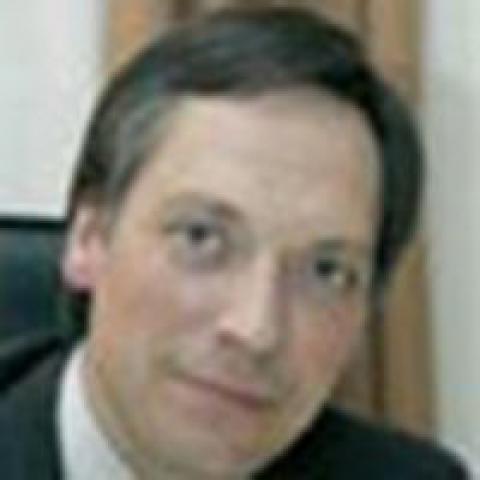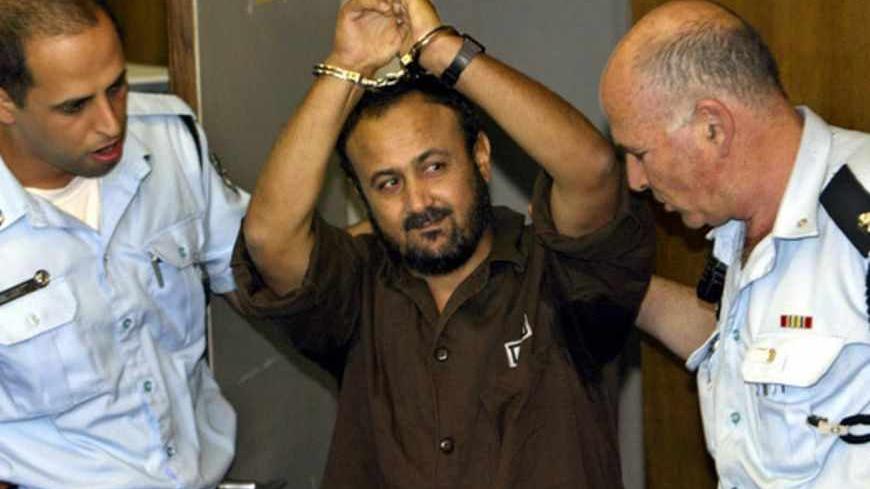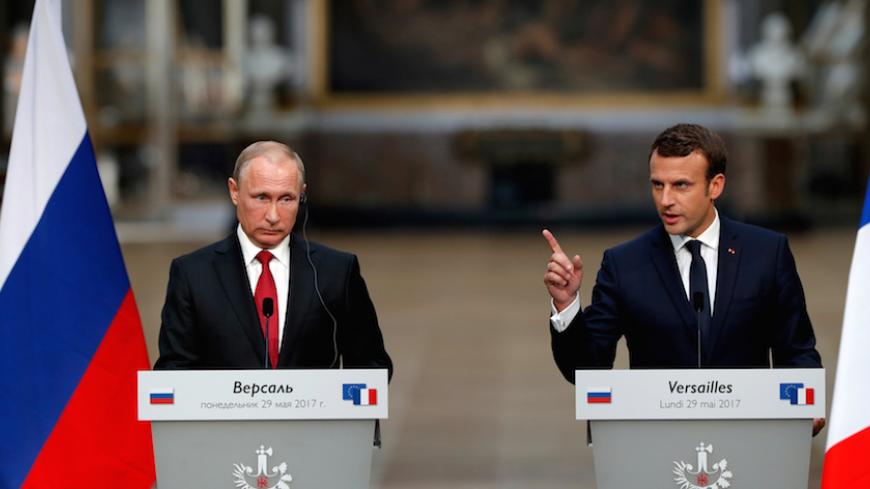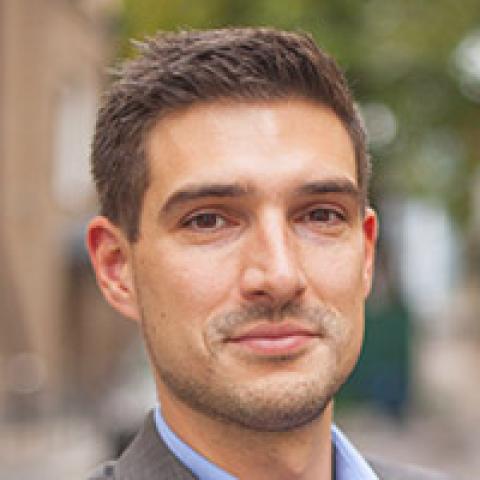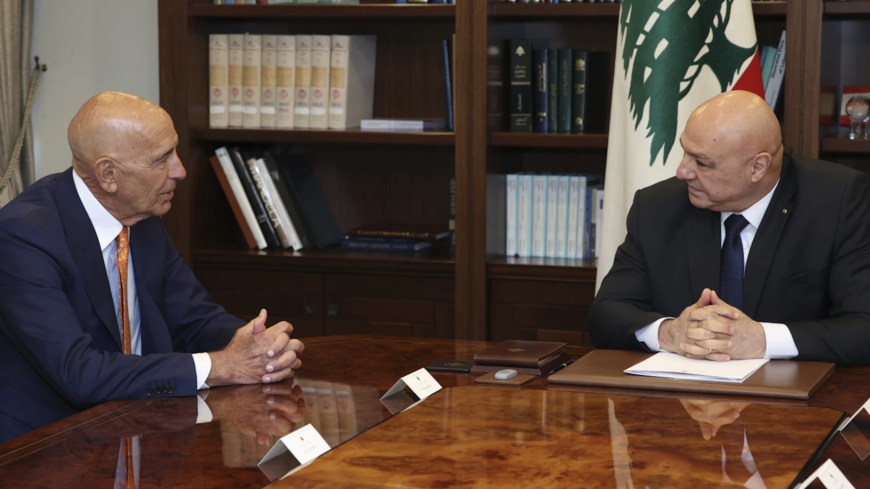Former French PM says Trump has ‘immense opportunity’ in Mideast
Dominique de Villepin, who recently announced a new political party, says in an exclusive written interview with Al-Monitor that France has a vital role to play in promoting regional cooperation.
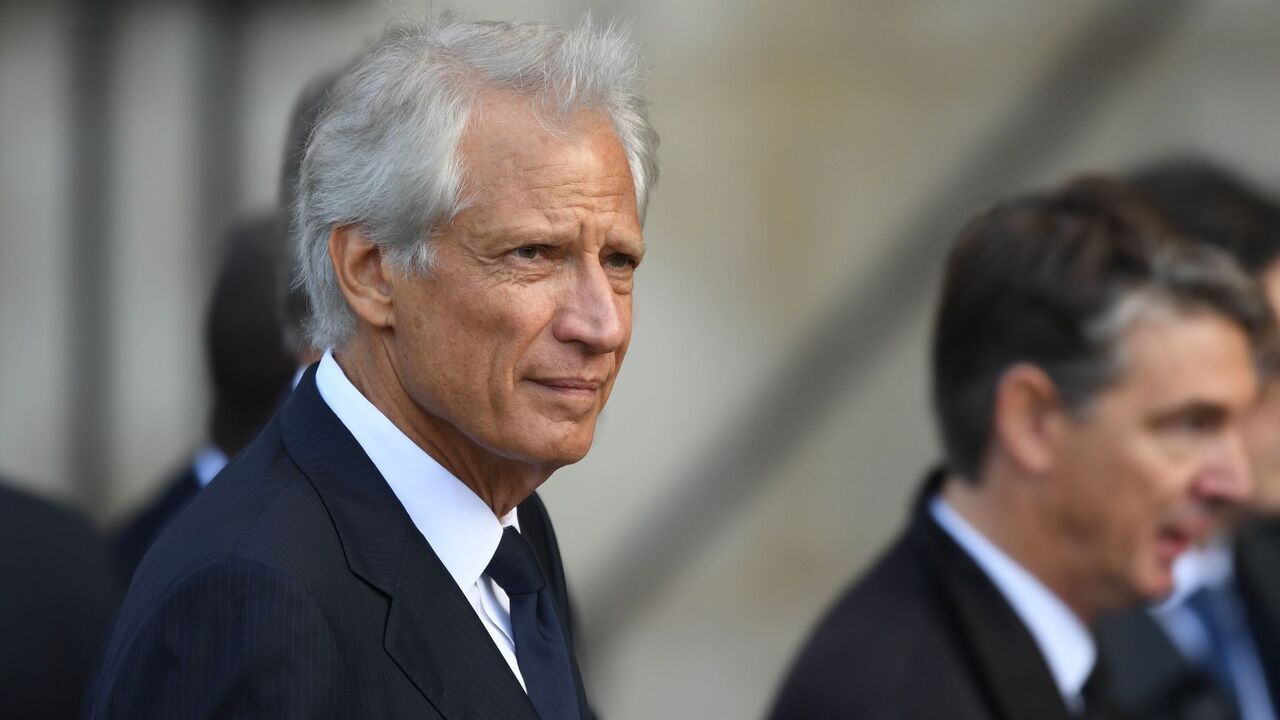
Dominique de Villepin’s star power in French politics is again on the rise.
Just this week, the former prime minister announced a new political party, Humanist France, in advance of the 2027 presidential elections.
“This movement is for everyone,” said de Villepin, who has not yet joined the presidential debate but has also not ruled out an eventual run.
“We need to unite all French people to defend social justice and the republican order,” he said.
In an exclusive written interview with Al-Monitor, de Villepin, one of France’s most distinguished diplomats and public officials, noted that the unique and extraordinary role of “resistance” in French history, and in the French character, “is essential again today because the republican spirit is dissolving in France.”
“I believe this resonates with the recent history of the Middle East,” adds de Villepin, “as there, too, the demand for dignity was central at the starting point of the Arab Spring.”
De Villepin, who has been associated with the center-right in French politics and who stepped back from politics over a decade ago, has also struck a chord over the past two years with all sides of the political spectrum with his criticism of the Israel-Hamas war in Gaza.
“One day the doors of Gaza will have to be opened, and what will be discovered there will be a shock to the international conscience, and especially to Arab public opinion,” de Villepin tells Al-Monitor.
De Villepin, who as foreign minister was the bete noire of the George W. Bush administration for leading France’s opposition to the US invasion of Iraq, has a different take on US President Donald Trump’s approach to Iran and the Middle East.
While Bush was a “prisoner of ideology,” according to de Villepin, Trump is a “free spirit” and a “pragmatist,” as well as “a disruptor driven by the aspiration to push the boundaries and get things moving.”
“This can be a positive starting point if there is also the will to act in the long run and with determination,” he writes.
De Villepin has an expansive vision of the need for a reordering of the Middle East following the wars with Iran and in Gaza. It begins with the United States, but includes vital roles for France and Europe.
“Realism requires recognizing that most of the keys to the region are today in Washington, but also that all the locks they can open are in the Middle East,” explains de Villepin. “We must act with the new leaders of the region, with the sole obsession of seeking lasting peace. President [Joseph] Aoun in Lebanon, President [Ahmed] al-Sharaa in Syria, Crown Prince Mohammed bin Salman in Saudi Arabia embody this new generation.”
“To maintain American power, it is first necessary to maintain a regional order, to show that one is capable of bringing rivals and even enemies to the table,” writes de Villepin. “Donald Trump has an immense opportunity in this regard, because he is perceived as likely to carry out his threats and gives the impression of really wanting to change the regional order. But it is on condition of being aware of the risks of the war and domination spiral that can only lead to more war and domination. The key today is to engage in a political process to score a decisive point for the region and for the world order.”
“France has friendships and interests in the Middle East that it must preserve and protect,” writes de Villepin. “But above all, it has always advocated for regional cooperation that can help countries in the region emerge from their crises. It is in everyone's interest to build strong, viable and peaceful nation-states, protecting minorities and focusing on education, health and development.”
“It is France's experience that commerce, the unification of a large market, is a way to access an order of peace,” added de Villepin, a position aligned with the Trump administration’s call for a postwar Middle East defined by “commerce, not conflict.”
Below is the full transcript of Al-Monitor’s written interview with Dominique de Villepin, former prime minister of France.
Al-Monitor: Before we get into the Middle East, tell us what you mean by the French “spirit of resistance” and how it applies in the current political climate.
De Villepin: France has a special history. It has experienced excesses, deviations and humiliations. But each time it has learned to think against itself, against the obvious, against the word of the strongest. It is often an ungrateful task but an indispensable one, to keep the conscience awake. It is a country of wars, civil wars, that knows the price of divisions. "Resist" was the word engraved in the tower of a prison by a young Protestant, Marie Durand, imprisoned for 38 years under the absolute monarchy. Resistance was thus the watchword of the Protestants in the Wars of Religion, as well as those who resisted, at the risk of their lives, against Nazi barbarism from 1940 to 1945, often with only a simple "no" as a starting point — the refusal of the unacceptable, a demand for dignity. But resistance is also about refusing confrontation and choosing to come together, as some moderates, such as Alexis de Tocqueville, advocated in their view of the French Revolution. Resisting oppression, resisting the temptation of violence, is essential again today because the republican spirit is dissolving in France. I believe this resonates with the recent history of the Middle East, as there, too, the demand for dignity was central at the starting point of the Arab Spring.
Al-Monitor: What role does the Middle East play in French politics today, and what role do you believe the region will play in the 2027 elections?
De Villepin: Today, the political crystallization around Middle Eastern issues seems absurd and harmful, to me. Peace is neither right nor left; it is in everyone's interest. International law is neither right nor left; it is the backbone of France in its relations with the world. And it is the foundation of the entire international order. I hope that the issue of Gaza will cease to be instrumentalized for ideological visions, especially by those who want to make the absurd amalgamation between Palestinians and Muslims in France as well as between the most radicals in the Israeli government and the Jewish population, and that we all together do the work of lucidity, humanity and equity that allows us to move concretely toward sustainable political solutions. But it is a symptom of a more general phenomenon, undoubtedly linked to globalization, by which foreign policy issues and domestic policy issues become increasingly porous to each other, to the point of merging. It is a sign that our conceptions of the role of the state and the vital importance of each one's sovereignty no longer protect us enough. This question of independence, of fidelity to our collective French identity, is, in my opinion, the central issue of the 2027 election.
Al-Monitor: Is there a role for France and Europe in the Middle East, given the predominant role of the United States? How could, or should, the US-France relationship be managed, or leveraged, in dealing with the region?
De Villepin: France has a voice in the Middle East. It is the legacy of its history, its commitment and its geographical proximity. It remains listened to; in any case it raises expectations. However, today we must take into account the realities, which are twofold: America has long been predominant in the Middle East, through its alliances, its economic ties, the 40,000 men of its military bases. But at the same time, the United States will be less and less able to ensure a lasting and peaceful hegemony in the region. We are returning, whether we like it or not, to a logic of balance of power. Mono-vector policies pose risks of overexposure for America. It is essential to diversify approaches, responsibilities, methods. The US-France relationship based on friendship without alignment is, in my opinion, the laboratory of this diversification toward multi-vector stabilization policies: several actors, several visions, several sectors of application — politics, economy, energy, water resources, finance. It is about trying something new in a time of weakening multilateralism, including involving other major world powers — China, Russia, India, Brazil — to sponsor such actions.
Realism requires recognizing that most of the keys to the region are today in Washington, but also that all the locks they can open are in the Middle East. We must act with the new leaders of the region, with the sole obsession of seeking lasting peace. President Aoun in Lebanon, President Al-Sharaa in Syria, Crown Prince Mohammed bin Salman in Saudi Arabia embody this new generation.
Finding an alternative to hegemonic logic involves building a permanent regional forum based on simple principles: the inviolability of borders, once internationally recognized; non-interference in the internal affairs of sovereign states; cooperation on major economic development issues. Infrastructure can be the key to both inclusive growth in the region and the laboratory for integrating sometimes unnecessarily competing international projects, for example with China's Silk Roads and the Indo-Western initiative of the India-Middle East-Europe Economic Corridor (IMEC), as well as the European Global Gateway project. At a time of saturation of communication channels, we must enter into a logic of global territorial planning, relying on numerous regional initiatives, particularly in Saudi Arabia.
France and Europe have a voice and experience to assert in accompanying the resolution of the Iranian issue. As early as 2003, France initiated — when I was minister of foreign affairs — with Germany and the UK the first diplomatic initiative to enforce the Nuclear Non-Proliferation Treaty in Iran. Today, we must engage in a joint initiative between the United States and Europe and expand the process in two aspects. Expand the issues to be addressed, including, in addition to the control of the civilian nuclear program, the Iranian ballistic program and military assistance to regional militias. Also expand the participants, integrating the European E3, of course, but also the UN P5, with China and Russia and the regional powers of the Middle East.
Al-Monitor: You were the bete noire of the Bush administration’s intervention in Iraq. How do you see the current conflict with Iran? How do you compare Trump’s handling of the crisis with Bush's? Are the situations comparable?
De Villepin: The similarities are only apparent. It is very different in my opinion because George W. Bush and Donald Trump are very different. One was a prisoner of ideology and, to some extent, of history, directing the anger of an America wounded by the Sept. 11 attacks toward an unrealistic project of regime change throughout the Middle East, which ultimately proved counterproductive by bogging down the effort of the American army and giving the keys of Iraq to the main regional antagonist, Iran. Donald Trump is a free spirit, he is above all a pragmatist who wants to score points for himself and for America. One can be in frontal disagreement with him, one must even be on many points, but that cannot prevent working together by identifying convergences of interest. He is a disruptor driven by the aspiration to push the boundaries and get things moving. This can be a positive starting point if there is also the will to act in the long run and with determination.
But there is a commonality between these two moments, 2003 and 2025, in my opinion, an error of appreciation by America on its long-term interests in the region. The United States always runs the risk of being captive to its alliances and the divergent interests of its various allies in the region. To maintain American power, it is first necessary to maintain a regional order, to show that one is capable of bringing rivals and even enemies to the table. Donald Trump has an immense opportunity in this regard, because he is perceived as likely to carry out his threats and gives the impression of really wanting to change the regional order. But it is on condition of being aware of the risks of the war and domination spiral that can only lead to more war and domination. The key today is to engage in a political process to score a decisive point for the region and for the world order. Force cannot be the only answer.
Al-Monitor: You have taken a strong position on Gaza, and it seems to have struck a chord, including on the left. How do you see the path forward, once there is a ceasefire, and what will be the longer-term impact of the crisis for the region?
De Villepin: What will the Middle East look like after the current outbreak of violence? The dynamics of the Abraham Accords have profoundly changed. Arab powers will occupy a more central and decisive role. This will, for example, give Saudi Arabia a key role and a heavy responsibility. The weakening of Iran eases a historical threat, giving them more room for maneuver, while Israel's unprecedented strength on the regional scene will necessarily provoke desires for rebalancing. Moreover, the Arab states themselves are gradually recovering from the exhaustion of the wave of civil wars born of the Arab Spring. Lebanon finally has a president. Syria is seeking a path to national reconciliation, still uncertain. This — added to the fact that one day the doors of Gaza will have to be opened and what will be discovered there will be a shock to the international conscience, and especially to Arab public opinion — makes the reinvention of a political process for the rights of the Palestinian people inevitable and indispensable, whatever some extremists may imagine.
But it is the entire regional security architecture that needs to be rebuilt and actually founded. The regional order of the Middle East that will emerge from the current chaos must be based on balance, respect and justice. These are the three simple principles that international diplomacy must place at the heart of the reconstruction.
Balance, because the Middle East cannot bear any hegemony, whatever its intentions. It is inscribed in the historical realities of the region since the end of the Ottoman Empire. First, because the region has always been a crossroads and a stake for all the world powers that need it to remain an open space for trade and exchanges. Secondly, because the ethnic and religious mosaic of the Middle East multiplies the candidates for power in the region — today Israel, Iran, Turkey, Saudi Arabia and Egypt. There is only one lasting point of agreement between all these powers; it is the refusal that one of them exercises excessive influence. It is the realistic basis on which the region must be rebuilt.
The second principle is respect, because the history of the Middle East has known too many imperial logics, too many interferences in sovereign territories. The heart of common action must be the respect of sovereignty, the fight against interference and the fight against terrorist organizations that plunge the region into a destructive spiral. Today, the first point of application of such a joint strategy must be Lebanon, a nation martyred by regional divisions. France has a particular responsibility here, due to strong ties with Lebanon and the Lebanese.
The third principle is justice, because one cannot build a lasting order on the misery of peoples. This is what makes the Palestinian question central, for the region, but also for the world, because for the Global South, the Western silence on what is happening in Gaza is perceived as the ultimate demonstration of "double standards."
Today, Israel has imposed itself by arms in a war on multiple fronts — Gaza, West Bank, South Lebanon, Syria, Yemen, Iran. It must seize this momentary advantage to make it an opportunity for lasting peace and a historic agreement with stabilized and sovereign Arab states. It is up to the victor to take the first step toward real peace. Europe and France must be present alongside Israel, deploying a political vision that takes into account all the issues, and first of all the need for the return of hostages still held by Hamas in Gaza. This today involves the opening of a political process leading to the recognition of a Palestinian state, under international guarantees and initial governance, to allow the emergence of social, economic and political structures for self-government.
Al-Monitor: Trump’s policy is connected to a broader vision of a Middle East dominated by "commerce, not conflict." How do you assess that vision? Is it something you, and France, could support?
De Villepin: France has friendships and interests in the Middle East that it must preserve and protect. But above all, it has always advocated for regional cooperation that can help countries in the region emerge from their crises. It is in everyone's interest to build strong, viable and peaceful nation-states, protecting minorities and focusing on education, health and development. It is France's experience that commerce, the unification of a large market, is a way to access an order of peace. This is what we experienced with the construction of Europe after 1945. But we also know that political cooperation is not the outcome of commerce but its prerequisite. We must first sit around the table. Especially since we are at a key moment in the Middle East, but also in the world: We are witnessing both a reconfiguration of power — the cards are being reshuffled among the main actors and the rules of the diplomatic "game" are changing to adapt to a world of growing shortages — but we are also witnessing a transformation that creates historical opportunities: exponential development of AI and energy transition. It is a new industrial revolution, and the Middle East is a major breeding ground for entrepreneurs, ideas and resources to activate to align the needs of reconfiguration and the necessities of transformation.

